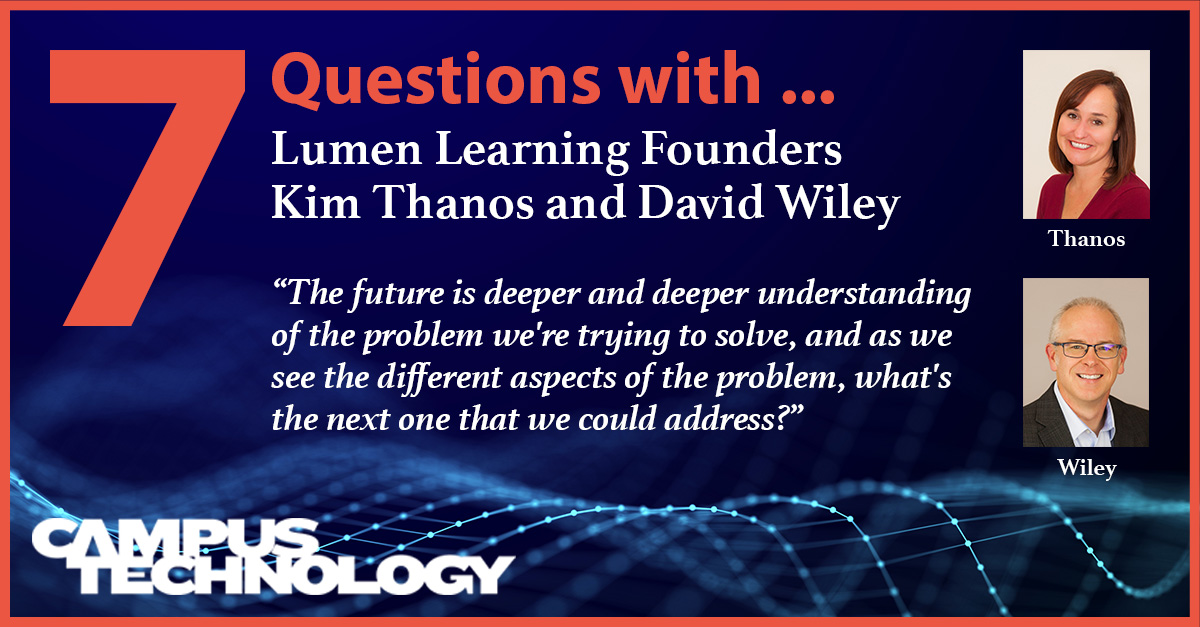7 Questions with Lumen Learning Founders Kim Thanos and David Wiley
Over the past decade, Lumen Learning has expanded its focus on open educational resources to encompass courseware, professional development, online community building and more. Here's how the company is tackling challenges of equity and student success.
Digital courseware provider Lumen Learning recently announced a Gates Foundation-funded initiative to create and implement equitable course materials for gateway courses, with the goal of eliminating race and income as predictors of student success. The company is partnering with minority-serving institutions to co-design and pilot the courseware, starting with a reinvention of Introduction to Statistics. We sat down with Lumen founders Kim Thanos and David Wiley to find out more about their work. The following conversation has been edited for length and clarity.
Campus Technology: October marked Lumen Learning's 10-year anniversary. Could you talk a little bit about how the company started?
David Wiley: Lumen had its beginnings back in 2010 with Project Kaleidoscope, a grant-funded effort to support faculty at eight institutions across the country in adopting OER in place of the proprietary materials they'd been using before. If you remember back to that decade, there'd been $100 million dollars spent by foundations funding the creation of OER — but nobody was actually using them in class. They were using them as supplements, but they weren't using them in place of other materials. So they weren't actually saving students any money and they weren't enabling the impact that we all hoped OER could have.
At the end of that project, we had the opportunity to propose another grant to the [Bill and Melinda Gates Foundation], where they set a stretch goal for us of trying to work with 30 institutions. It was kind of a challenge from the foundation: You did it with eight, could you do it with 30?

And that's really the impetus of how Lumen got started, with our interest in 1) can we use OER to improve access to course materials for students, and 2) will increased access to course materials result in better student learning. And it turns out that the answers to those two questions are that OER will reliably, consistently save students money. But faculty adopting OER does not reliably, consistently lead to better outcomes for students. More often than not, it leads to the same outcomes at lower costs, which is great. Getting the same thing for lower cost is terrific. But over time, we started to get the sense that the status quo in terms of success, especially for marginalized groups of students — it wasn't okay just to have the same kind of bad results but make them less expensive.
CT: I remember Project Kaleidoscope well, because Campus Technology recognized one of the partner colleges with an Innovators Award in 2012. It's fun to think all the way back to that time, and remember just how novel the idea was to replace textbooks entirely with OER alternatives.
Kim Thanos: We knew the problem we were trying to solve, and we were exploring potential solutions — and that centered around access and affordability, with this goal of better success because of access and affordability. And like David said, what we learned was we could solve part of that, and then more was needed. That kind of exploration, trial and error, is really core to Lumen's DNA. I'm not sure we knew it at the time, but it really is a situation of peeling the onion around student success: You solve a problem that exposes a greater depth to the larger set of challenges.